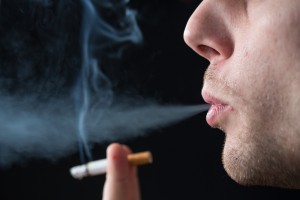
Hot on the heels of a recent study suggesting a dose-response relationship between tobacco smoking and subsequent risk of psychosis, a systematic review and meta-analysis (including the data from that prospective study) has now been published, again suggesting that we should be considering the possibility that smoking is a causal risk factor for schizophrenia.
As I outlined in my earlier post, smoking and psychotic illness (e.g., schizophrenia) are highly comorbid, and smoking accounts for much of the reduced life expectancy of people with a diagnosis of schizophrenia. For the most part, it has been assumed that smoking is a form of self-medication, to either alleviate symptoms or help with the side effects of antipsychotic medication.

It’s widely thought that people with psychosis or schizophrenia use smoking as a way to self-medicate and relieve their symptoms.
Methods
This new study reports the results of a systematic review and meta-analysis of prospective, case-control and cross-sectional studies. The authors hoped to test four hypotheses:
- That an excess of tobacco use is already present in people presenting with their first episode of psychosis
- That daily tobacco use is associated with an increased risk of subsequent psychotic disorder
- That daily tobacco use is associated with an earlier age at onset of psychotic illness
- That an earlier age at initiation of smoking is associated with an increased risk of psychotic disorder
The authors followed MOOSE and PRISMA guidelines for the conduct and reporting of systematic reviews and meta-analyses, and searched Embase, Medline and PsycINFO for relevant studies. They included studies that used ICD or DSM criteria for psychotic disorders (including schizophrenia, schizophreniform disorder, schizoaffective disorder, delusional disorder, non-affective psychotic disorder, atypical psychosis, psychotic depression, and bipolar mania with psychotic features).
To test the first hypothesis, studies with a control group were used to calculate an odds ratio. To test the second, prospective studies in which rates of smoking were reported for patients who developed psychotic disorders compared to controls were included, so risk ratios could be calculated. To test the third and fourth, prospective and case-control studies were included, and for the onset of psychosis, cross-sectional studies were also included.
Effect size estimates (weighted mean difference for continuous data, and odds ratios for cross-sectional data or relative risks for prospective data) were combined in a random-effects meta-analysis.
Results
A total of 61 studies comprising 72 independent samples were analysed. The overall sample included 14,555 tobacco users and 273,162 non-users.
- The overall prevalence of smoking in people presenting with their first episode of psychosis was higher than controls (12 case-control samples, odds ratio 3.22, 95% CI 1.63 to 6.33, P = 0.001). This supports hypothesis 1.
- Compared with non-smokers, the incidence of new psychotic disorders was higher overall (6 longitudinal prospective samples, risk ratio 2.18, 95% CI 1.23 to 3.85, P = 0.007). This supports hypothesis 2.
- Daily smokers developed psychotic illness at an earlier age compared with non-smokers (26 samples, weighted mean difference -1.04 years, 95% CI -1.82 to -0.26, P = 0.009). This supports hypothesis 3.
- Age at initiation of smoking cigarettes did not differ between patients with psychosis and controls (15 samples, weighted mean difference -0.44 years, 95% CI 1-.21 to 0.34, P = 0.270). This does not support hypothesis 4.

Daily tobacco use is associated with an increased risk of psychosis and an earlier age at onset of psychotic illness.
Conclusion
The authors conclude that the results of their systematic review and meta-analysis show that daily tobacco use is associated with an increased risk of psychotic disorder and an earlier age at onset of psychotic illness, although the magnitude of the association is relatively small.
Interestingly, the authors interpret their results in the context of the Bradford Hill criteria for inferring causality (which consider the strength, consistency, specificity, temporality, biological gradient, plausibility, coherence, experiment, and analogy of an association). They argue that, where these criteria can be applied (the specificity criterion cannot be applied because smoking affects so many disease processes, while the experiment criterion is not met because animal models of psychotic illness that capture important features such as delusions are impossible), they do appear to be met by the evidence available.
Limitations
There are a number of important limitations to this study, which the authors themselves acknowledge:
- The first is that all analyses relied on observational data, which makes strong causal inference impossible. Longitudinal prospective studies help somewhat in this respect, but only a small number were available for inclusion in the analysis of risk of developing psychosis between smokers and non-smokers. Moreover, even these studies cannot exclude the possibility that symptoms present before a first full episode of psychosis may have led to smoking initiation (i.e., self medication).
- Another important limitation is that very few studies measured or adjusted for use of other substances (most importantly, perhaps, cannabis, which has been widely discussed as a potential risk factor for schizophrenia). This is a potentially very important source of bias.
Nevertheless, this is a well-conducted systematic review and meta-analysis that brings together a reasonably large literature. The results appear robust, although given the observational nature of the data, and the fact that only data that were comparable across studies could be meta-analysed, any conclusions regarding causality need to be very tentative.

Very few studies in this review, measured or adjusted for use of other substances such as cannabis.
Summary
It seems that we should seriously consider the possibility that smoking is a causal risk factor for schizophrenia. Of course, the data available to date aren’t definitive, and we need to be very cautious about inferring causality from observational data, but this does feel like an area where there is growing, converging evidence from multiple studies using multiple methods.
It’s also worth bearing in mind that even if smoking is a causal risk factor, this does not preclude the possibility that smoking is also used as a form of self-medication. There are several thousand constituents of tobacco smoke; it is possible that some of these alleviate symptoms, while others exacerbate them. For this reason, we shouldn’t assume that nicotine is necessarily the culprit if smoking is indeed a causal risk factor; it may be (and Gurillo and colleagues discuss the biological plausibility of nicotine in this context), but that will need to be tested.
This last point is particularly important in the content of ongoing debate regarding the potential harms and benefits of electronic cigarettes. If smoking does turn out to be a causal risk factor for schizophrenia, then whether nicotine or something else in tobacco smoke is identified as the culprit will have an important bearing on this debate, and attitudes towards these products.

There are several thousand constituents of tobacco smoke; it is possible that some of these alleviate symptoms, while others exacerbate them.
Links
Primary paper
Gurillo P, Jauhar S, Murray RM, MacCabe J. (2015) Does tobacco use cause psychosis? Systematic review and meta-analysis. Lancet Psychiatry 2015. doi: 10.1016/S2215-0366(15)00152-2 (Open access paper: features audio interview with authors)
Munafo M. Smoking and risk of schizophrenia: new study finds a dose-response relationship. The Mental Elf, 1 Jul 2015.


Does tobacco use cause psychosis? http://t.co/g3JfoRLfKk #MentalHealth http://t.co/2LL0LYgptg
@Mental_Elf if ur smoking tobacco laced with salvia it sure will! #mind trip
@Mental_Elf It’s not plausible that smoking causes psychosis and there are other reasons for the association
@Mental_Elf nope, definitely not!
@Mental_Elf This is just silly speculation and doesn’t give science a good name
@Mental_Elf It’s just silly to speculate that smoking causes psychosis and doesn’t give science a good name
@DBDouble @Mental_Elf @ClinpsychLucy is it more silly than speculating about cannabis causing psychosis?
@PaedMHAssoc At least cannabis intoxication could be confused with psychosis @Mental_Elf @ClinpsychLucy
@DBDouble @Mental_Elf @ClinpsychLucy fair point.
@Mental_Elf Excess striatal dopamine as cause of schizophrenia doesn’t provide plausibility for smoking/psychosis link if theory is wrong
Today @MarcusMunafo on recent @LancetPsych SR by @jamesmaccabe @sameerjauhar Does tobacco use cause psychosis? http://t.co/bFzBdfovUO
@Mental_Elf Here today gone tomorrow when people realise silly idea that smoking causes psychosis @MarcusMunafo @jamesmaccabe @sameerjauhar
Thanks for the constructive comments- I guess if you don’t believe in the dopamine hypothesis, it is going to be difficult to convince you about any biologically plausible hypothesis of psychotic illness.
@DBDouble @Mental_Elf @MarcusMunafo @jamesmaccabe thank you
@Mental_Elf what is the foundation for the facts?
@Mental_Elf @profelainefox @MarcusMunafo iirc your bap talk showed >halving of smoking since 1950s. Has psychosis prevalence also fallen?
@jonroiser @Mental_Elf @profelainefox Very difficult to know because way prevalence measured changed / quality of data poor (1/2)
@jonroiser @Mental_Elf @profelainefox Also, any effect of smoking (if causal) pretty small, so difficult to pick up in prevalence data (2/2)
@jonroiser @Mental_Elf @profelainefox @jonroiser this was similar to the conversation about cannabis a few years ago between R Murray and D Nutt
Daily tobacco use may be associated with an increased risk of psychotic disorder http://t.co/tQLF2hC3ED from the @Mental_Elf
It’s widely thought that ppl w/ psychosis or schizophrenia use smoking as a way to self-medicate & relieve symptoms http://t.co/bFzBdfovUO
RT @AddactionUK: Meta-analysis of the links between smoking tobacco and psychotic disorders: http://t.co/9v6Y6hiPw9. Fascinating post from …
RT @CoyneoftheRealm: Contrast @MarcusMunafo http://t.co/D7hLNwDKN8 with warped coverage in http://t.co/l8KLHYk1TC @Mental_Elf https://t.co…
How robust is the evidence linking tobacco to schizophrenia? A critique by @MarcusMunafo for @Mental_Elf http://t.co/2wJu6DnDCp
Does tobacco use cause psychosis? @MarcusMunafo reviews at a recent new study over on @Mental_Elf http://t.co/BEysttI5N4
Systematic review: daily tobacco use is assoc w/ increased risk of psychosis & earlier age at onset of illness http://t.co/bFzBdfovUO
What’s the truth? Can tobacco really cause #psychosis? Find out here: http://t.co/M0wCwyNwcQ #schizophrenia
Does #tobacco use cause psychosis? http://t.co/ZuIV4cDLUG
Tobacco smoke has thousands of constituents; perhaps some alleviate psychosis symptoms & others exacerbate them http://t.co/bFzBdfovUO
Does tobacco use cause psychosis? https://t.co/SHJNbRA75X via @sharethis
Don’t miss: Does tobacco use cause psychosis? http://t.co/bFzBdfovUO #EBP
Does #tobacco use cause #psychosis? Review of a #metaanalysis & #systematicreview by @Mental_Elf http://t.co/oWAH2RHYhQ #schizophrenia
RT @mental_elf: Does tobacco use cause psychosis? http://t.co/tG74d4HP01 #EBP
[…] http://www.nationalelfservice.net/mental-health/psychosis/does-tobacco-use-cause-psychosis/ […]
Nicotine is a stimulant.
Sleep deprivation causes behavioral symptoms and death in all mammals including humans.
I have just demonstrated a clear causal link between nicotine abuse and mental illness.
Anyone who is “Self medicating” with nicotine, without trying exercise or sleep, is foolish.
[…] This is a very important study as it is the first to identify a genetic variant robustly associated with anorexia nervosa. However, perhaps the more interesting results are the genetic correlations. It is worth noting that genetic correlations may also reflect a causal pathway, for example from educational attainment to anorexia nervosa risk or vice versa; something I have discussed previously in the context of cigarette smoking and schizophrenia. […]
[…] using cannabis you’re more likely to be using other drugs as well). Previous studies suggest that tobacco and alcohol use may also confound the relationship between cannabis use and psychosis (Jauhar, […]
[…] Does tobacco use cause psychosis? […]